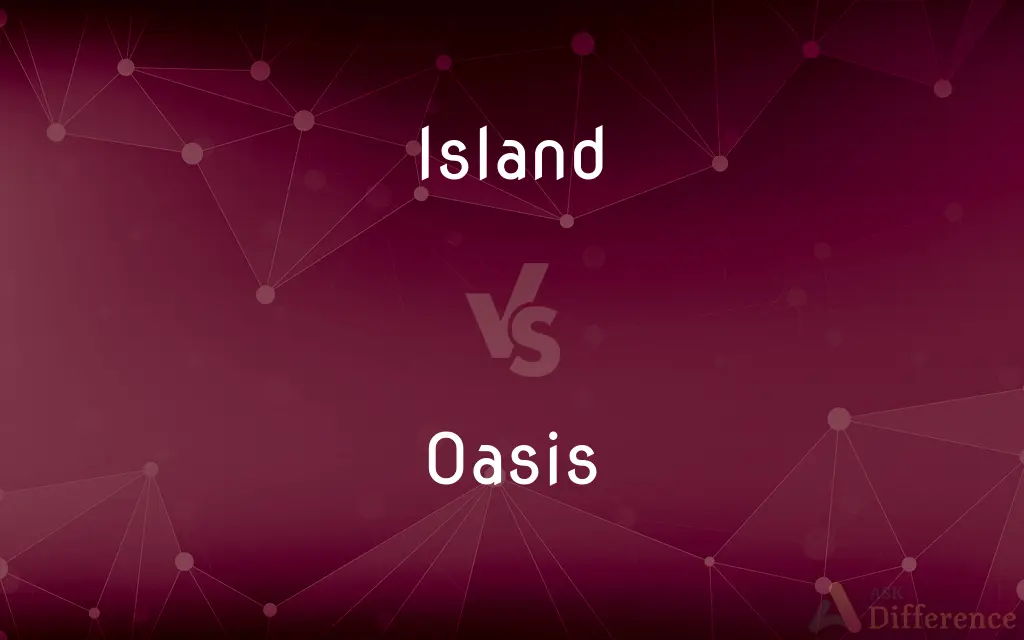Island vs. Oasis — What's the Difference?
By Tayyaba Rehman — Updated on September 28, 2023
An island is a landmass surrounded by water, while an oasis is a fertile spot in a desert where water is found.

Difference Between Island and Oasis
Table of Contents
ADVERTISEMENT
Key Differences
An island is essentially a piece of land that is entirely surrounded by water. This can range from vast landmasses such as Australia to tiny uninhabited pieces of land in the ocean. Islands can be found in oceans, seas, lakes, and rivers. On the other hand, an oasis is not defined by its surrounding landscape but by its internal characteristics. It is a green, fertile patch found within a desert, characterized by the presence of water and vegetation.
The existence of an island is often the result of various geological activities, including volcanic eruptions, tectonic movements, and sediment accumulation. Islands can be inhabited or uninhabited, and they can host diverse ecosystems. In contrast, the presence of an oasis is like a haven in the midst of vast and often inhospitable desert terrain. An oasis is often a lifeline for many desert-dwelling creatures and humans, as it provides essential water and shade.
While both islands and oases serve as refuges in their respective environments, their origins and roles differ. An island can be a country or part of one, influencing human civilization, culture, and geopolitics. Conversely, an oasis primarily serves as a respite in desolate areas, offering water and vegetation in otherwise barren landscapes.
In literature and broader cultural discourse, both island and oasis metaphors abound. An island can symbolize isolation, refuge, or a unique ecosystem, while an oasis might represent hope, survival, or a miraculous haven in a challenging environment.
Comparison Chart
Nature
Landmass surrounded by water
Fertile area in a desert with water
ADVERTISEMENT
Location
In oceans, seas, rivers, lakes
In deserts
Origins
Geological activities, sediment accumulation
Water sources like springs in deserts
Symbolism
Isolation, refuge, unique ecosystem
Hope, survival, haven in adversity
Importance
Can host civilizations, influence geopolitics
Vital for desert survival, provides water and vegetation
Compare with Definitions
Island
Natural habitat area
Coral islands are rich in marine biodiversity.
Oasis
Fertile desert spot
Travelers rested at the oasis to replenish their water supplies.
Island
Isolated area or group
Their views created an ideological island within the community.
Oasis
Serving refreshment
The café was a culinary oasis in the food desert.
Island
Lone entity
The solitary tree stood like an island in the vast field.
Oasis
Source of relief
In a desert of mediocrity, her talent was a refreshing oasis.
Island
Platform or raised area
The kitchen island provides extra counter space.
Oasis
Peaceful refuge
The library was an oasis of calm amidst the city's hustle.
Island
An island or isle is any piece of subcontinental land that is surrounded by water. Very small islands such as emergent land features on atolls can be called islets, skerries, cays or keys.
Oasis
Green area in urban space
The park acted as an oasis for city dwellers.
Island
Abbr. Isl. or Is. or I. A landmass, especially one smaller than a continent, entirely surrounded by water.
Oasis
In geography, an oasis (, plural oases, ) is a fertile area (often having a date palm grove) in a desert or semi-desert environment. Oases also provide habitats for animals and plants.
Island
An unattached kitchen counter providing easy access from all sides.
Oasis
A fertile or green area in a desert or wasteland, made so by the presence of water.
Island
A raised curbed area, often used to delineate rows of parking spaces or lanes of traffic.
Oasis
A situation or place preserved from surrounding unpleasantness; a refuge
An oasis of serenity amid chaos.
Island
The superstructure of a ship, especially an aircraft carrier.
Oasis
A spring of fresh water, surrounded by a fertile region of vegetation, in a desert.
Island
(Anatomy) A cluster of cells differing in structure or function from the cells constituting the surrounding tissue.
Oasis
(figuratively) A quiet, peaceful place or situation separated from surrounding noise or bustle.
The park was an oasis in the middle of the busy city.
Island
To make into or as if into an island; insulate
A secluded mansion, islanded by shrubbery and fences.
Oasis
A fertile or green spot in a waste or desert, esp. in a sandy desert, where the water table approaches the surface.
Island
A contiguous area of land, smaller than a continent, totally surrounded by water.
Oasis
Any refuge from a prevailing stressful, unpleasant, or annoying situation.
My one oasis in the dust and drouthOf city life.
Island
(by extension, in place names) A contiguous area of land, smaller than a continent, partially surrounded by water; A peninsula; A half-island.
Despite its name, Barry Island is actually a peninsula
Oasis
A fertile tract in a desert (where the water table approaches the surface)
Island
An entity surrounded by other entities that are very different from itself.
An island of colors on a butterfly's wing
Oasis
A shelter serving as a place of safety or sanctuary
Island
A superstructure on an aircraft carrier's deck.
Island
A traffic island.
The island in the middle of a roundabout
Island
(by extension, West Midlands dialect) A roundabout; A traffic circle.
Dunton island, near Birmingham, is one of the most confusingly labelled islands in the U.K.
In Coventry, you will often hear people say: “Turn right at the island”.
Island
A bench, counter, etc., that is not connected to a wall or other furniture and which can be used from any side.
Island
(government) An unincorporated area wholly surrounded by one or more incorporated areas.
Island
(grammar) A phrase from which a wh-word cannot be extracted without yielding invalid grammar.
Island
(transitive) To surround with water; make into an island.
Island
(transitive) To set, dot (as if) with islands.
Island
(transitive) To isolate.
Island
A tract of land surrounded by water, and smaller than a continent. Cf. Continent.
Island
Anything regarded as resembling an island; as, an island of ice.
Island
To cause to become or to resemble an island; to make an island or islands of; to isle.
Island
To furnish with an island or with islands; as, to island the deep.
Island
A land mass (smaller than a continent) that is surrounded by water
Island
A zone or area resembling an island
Island
Land surrounded by water
Manhattan is an island in New York.
Common Curiosities
Can you find islands in lakes?
Yes, islands can be found in oceans, seas, rivers, and lakes.
Can an island be man-made?
Yes, there are artificial islands constructed for various purposes.
Are all oases naturally occurring?
While most are natural, some oases are man-made or enhanced by human activity.
Do all islands have human inhabitants?
No, many islands are uninhabited, either due to remoteness or unsuitability.
Is an oasis always small in size?
No, while many are small, some oases can be quite expansive.
Share Your Discovery

Previous Comparison
Broiler vs. Cockerel
Next Comparison
Torte vs. KuchenAuthor Spotlight
Written by
Tayyaba RehmanTayyaba Rehman is a distinguished writer, currently serving as a primary contributor to askdifference.com. As a researcher in semantics and etymology, Tayyaba's passion for the complexity of languages and their distinctions has found a perfect home on the platform. Tayyaba delves into the intricacies of language, distinguishing between commonly confused words and phrases, thereby providing clarity for readers worldwide.














































